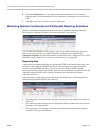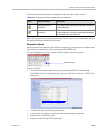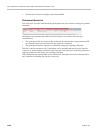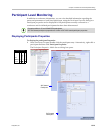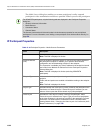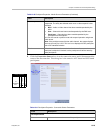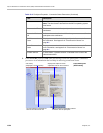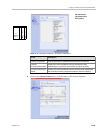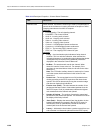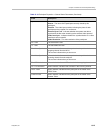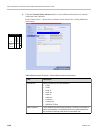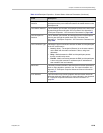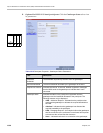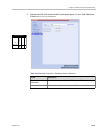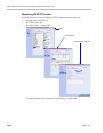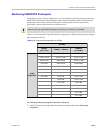
Polycom RealPresence Collaboration Server (RMX) 1500/2000/4000 Administrator’s Guide
13-26 Polycom, Inc.
Table 13-13 Participant Properties - Channel Status Parameters
Field Description
Channels Used When checked, indicates the channel type used by the participant to
connect to the conference: Incoming channels are endpoint to MCU,
Outgoing channels are from MCU to endpoint.
Channels:
• H.225/Signaling - The call-signaling channel.
• H.245/SDP - The Control channel.
• Audio in - Incoming audio channel
• Audio out - Outgoing audio channel
• Video in - Incoming video channel
• Video out - Outgoing video channel
• Content in - H.239/People+Content conferences
• Content out - H.239/People+Content conferences
• FECC in - The incoming FECC channel is open.
• FECC out - The outgoing FECC channel is open.
Columns:
• Faulty – A red exclamation point indicates a faulty channel
condition. This is a real-time indication; when resolved the
indication disappears. An exclamation point indicates that further
investigation may be required using additional parameters
displayed in the Advanced Channel Status tab.
• Bit Rate – The actual transfer rate for the channel. When
channel is inactive, bit rate value is 0. For example, if the
participant is connected without video, the bit rate for the video
channel is 0.
Note: The CTS Audio Auxiliary channel is used only for Content.
In all other cases, the bit rate shown in this column for this
channel is 0.
• Packet Loss – The accumulated count of all packets that are
missing according to the RTCP report since the channel was
opened. This field is relevant only during the connection stage
and does not display faulty indications.
• Fraction Loss (Peak) – The ratio between the number of lost
packets and the total number of transmitted packets since the
last RTCP report. Peak (in parentheses) indicates the highest
ratio recorded since the channel was opened.
• Number of Packets – The number of received or transmitted
packets since the channel has opened. This field does not cause
the display of the faulty indicator.
• Jitter (Peak) – Displays the network jitter (the deviation in time
between the packets) as reported in the last RTCP report (in
milliseconds). Peak (in parentheses) reflects the maximum
network jitter since the channel was opened.
• Latency – Indicates the time it takes a packet to travel from one
end to another in milliseconds (derived from the RTCP report).



